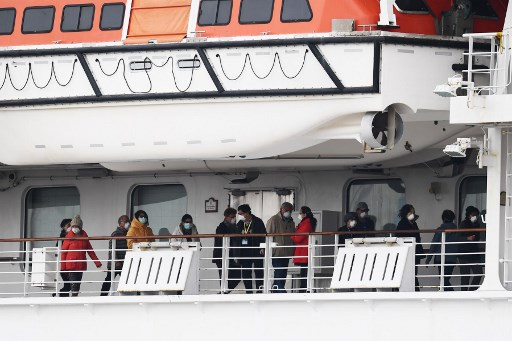Popular Reads
Top Results
Can't find what you're looking for?
View all search resultsPopular Reads
Top Results
Can't find what you're looking for?
View all search resultsConcerns rise over importing COVID-19 as hundreds of Indonesian crewmen come home
Cruise liners became notorious in the early stages of the epidemic when they became hotbeds of COVID-19 transmission.
Change text size
Gift Premium Articles
to Anyone
N
inety-two Indonesian crewmen aboard a number of international cruise liners had tested positive for COVID-19 as of Wednesday morning, the Foreign Ministry indicated on a map of all affected Indonesians abroad on its official Twitter account.
The tweeted map also noted that all were "stable".
Hi #Diplomates, attached is the Global #COVID19 Update and Indonesian Citizen Protection as of 08/04; 08.00 Western Indonesian Time.
The map shows active COVID-19 Cases of Indonesian Citizen Abroad.#IndonesianWay pic.twitter.com/oiT17RiHj5
— MoFA Indonesia (@Kemlu_RI) April 8, 2020
Even so, the government still allowed hundreds of other crewmen to return to the country, as many cruise operators had halted their operations in response to the pandemic. The crewmen's return has raised concerns over whether this could worsen the disease's spread across the archipelago.
More than 1,000 crewmen had arrived back in the country by Wednesday. The foreign ministry confirmed that 963 crewmen had been repatriated by April 2 on commercial and charter flights funded by their cruise operators.
These included more than 200 Indonesian crewmen of the MSC Fantasia crew who arrived over the weekend in Denpasar, Bali, flying from Lisbon on Air Europa flight AE672 after disembarking in Portugal, where the cruise ship carrying 1,338 passengers had made port.
On the last day of March, 316 Indonesian crewmen of the MSC Splendida arrived by plane in Denpasar from Genoa, Italy, considered the epicenter of the European pandemic.
Read also: Cruise ship responsible for jump in Australia coronavirus cases
The ministry's data shows that an estimated 12,748 Indonesians work as crew members aboard 89 cruise ships around the world operated by 10 major cruise operators.
The crewmen's repatriation has given rise to worries of potential imported cases, as international cruise liners like Diamond Princess, World Dream, Westerdam and Zaandam emerged as "hot spots" of COVID-19 infection
The International Rescue Committee (IRC) reported that COVID-19 transmission occurred four times faster aboard Diamond Princess than during the peak of the outbreak in the Chinese city of Wuhan, where the virus was first detected.
As many as 712 out of the more than 3,700 passengers and crew aboard Diamond Princess contracted the virus during its two-month quarantine in Yokohama, Japan.
Despite concerns over compounding the outbreak in Indonesia, the foreign ministry said the government could not lawfully prevent its citizens from returning to the country, citing the 2011 Immigration Law. It added, however, that authorities could ramp up efforts to detect the disease upon their arrival.
All repatriated citizens are required to undergo all necessary health protocols at their port of entry, where health officials will take their body temperature, check them for symptoms and test them for the virus using rapid testing kits.
Returnees who tested positive for the virus are quarantined at their port of entry, while those who tested negative are advised to self-quarantine for 14 days at home.
“We will facilitate the needs of Indonesian citizens who have decided to come home, but they must obey the protocol so they won’t spread the virus,” said the Foreign Ministry's overseas citizen protection director, Judha Nugraha.
Read also: COVID-19: Govt to allocate Rp 100 billion to protect Indonesians abroad
Lawmakers, however, expressed their doubt over current measures.
Effendy Simbolon of the Indonesian Democratic Party of Struggle (PDI-P) pointed out the often lax implementation of health protocols at Indonesian ports.
“There is an inconsistency in the protocol as imposed on [Indonesians] and the government’s [effort]. It is very relaxed,” he said on Tuesday at a working meeting between House Commission I on foreign affairs and the ministry.
“The protocol as imposed on arrivals [aboard] international airlines, for instance, is extremely loose,” he noted.
The commission has asked the government to impose more stringent screening at all ports of entry in the country.










